【单元一遍过】Unit 1 Making New Friends Topic 2复习课件(共39张PPT)
文档属性
| 名称 | 【单元一遍过】Unit 1 Making New Friends Topic 2复习课件(共39张PPT) | 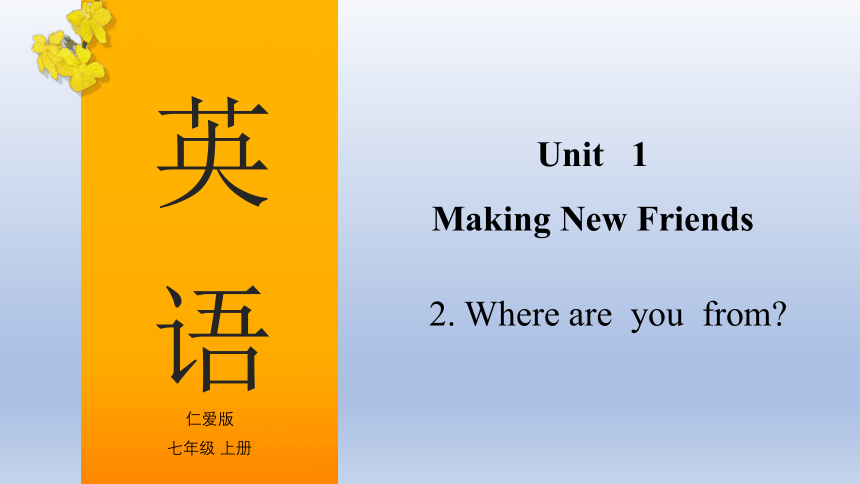 | |
| 格式 | pptx | ||
| 文件大小 | 2.0MB | ||
| 资源类型 | 教案 | ||
| 版本资源 | 仁爱科普版 | ||
| 科目 | 英语 | ||
| 更新时间 | 2023-07-12 22:24:22 | ||
图片预览

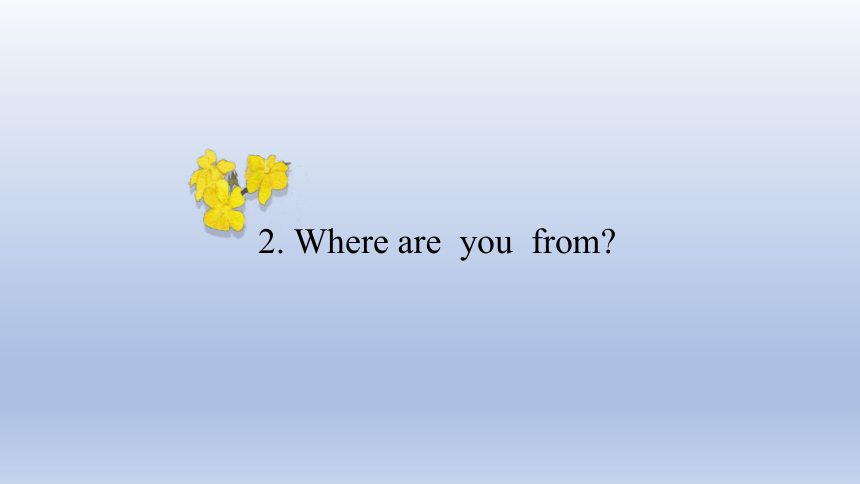
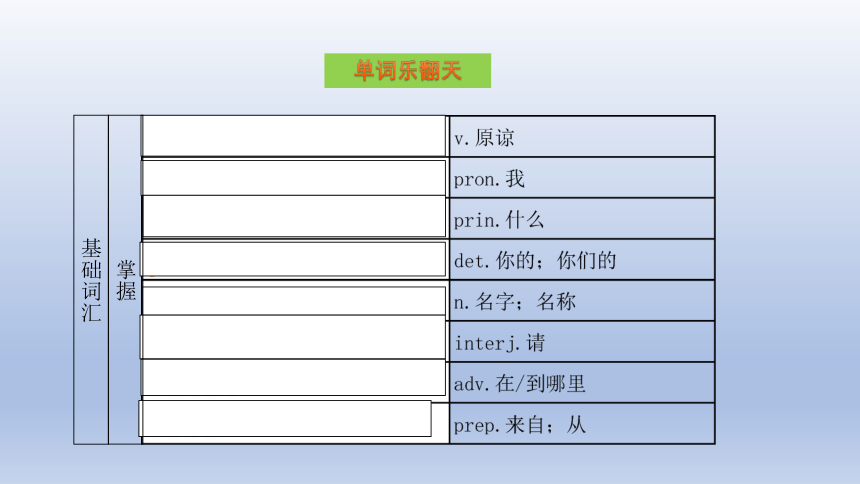
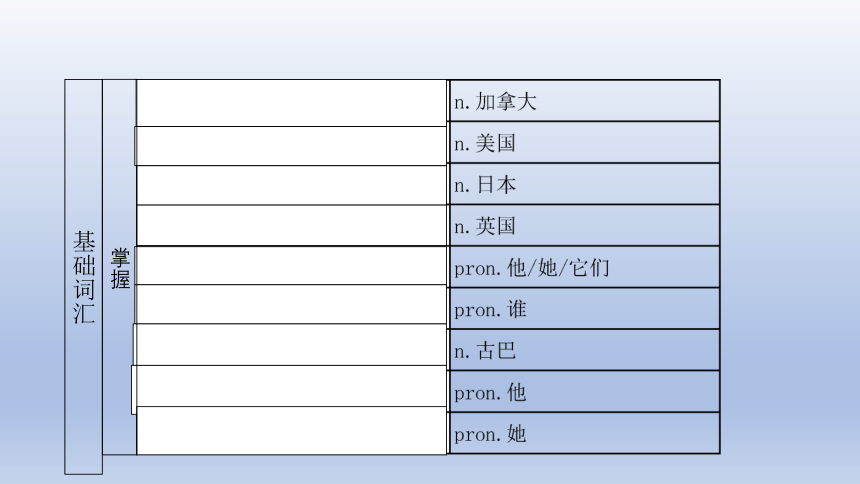
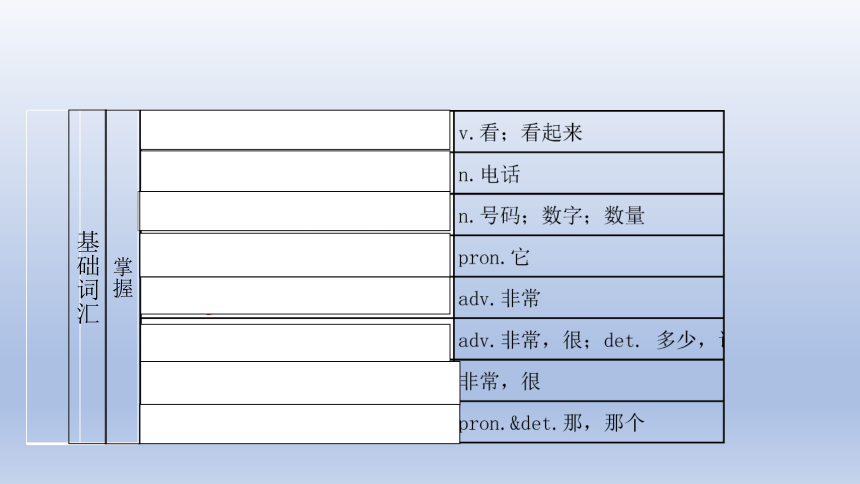
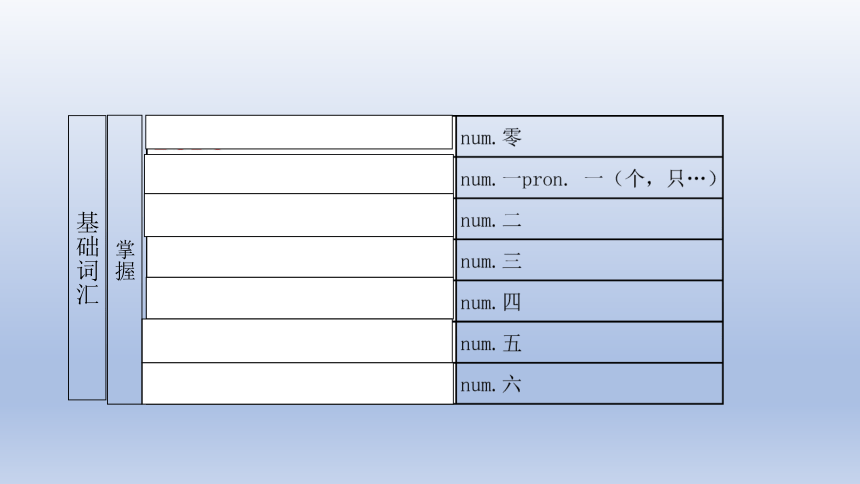
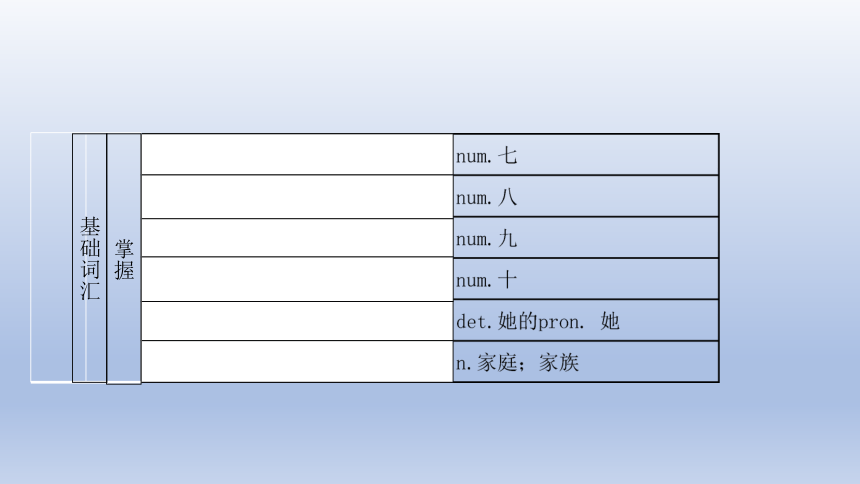
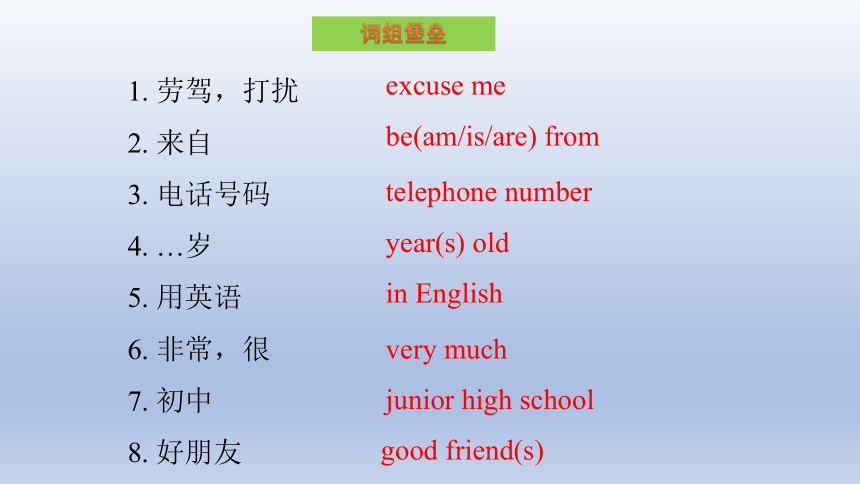
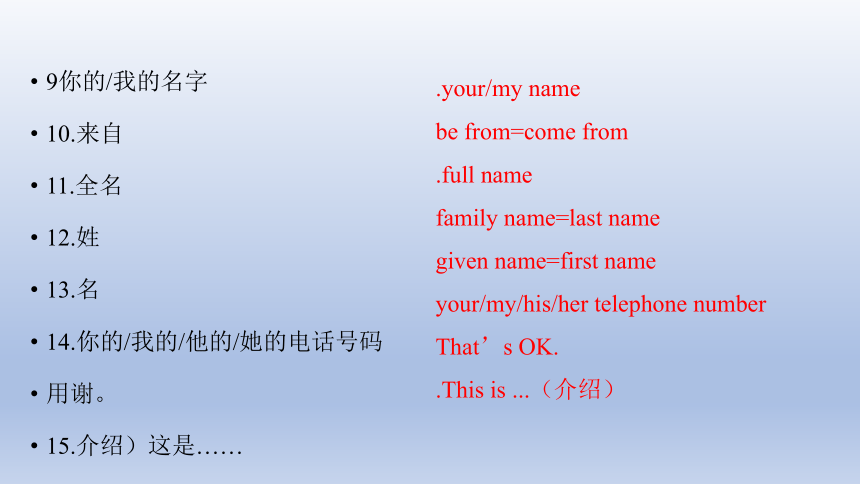
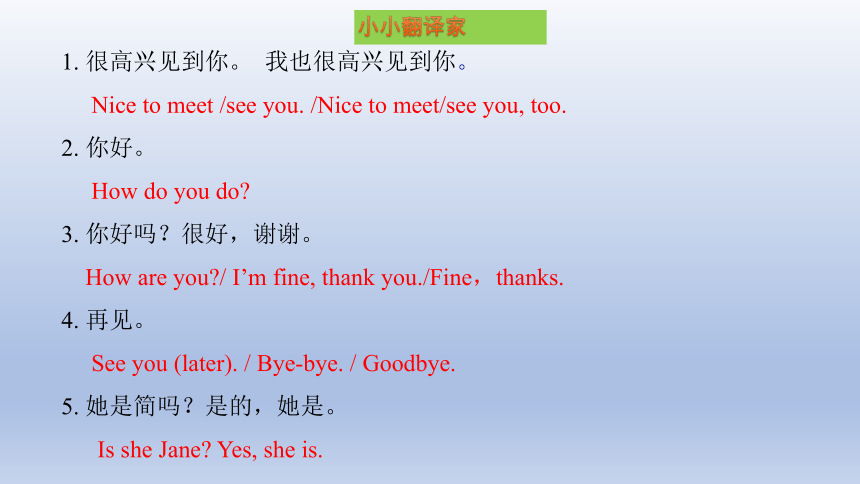
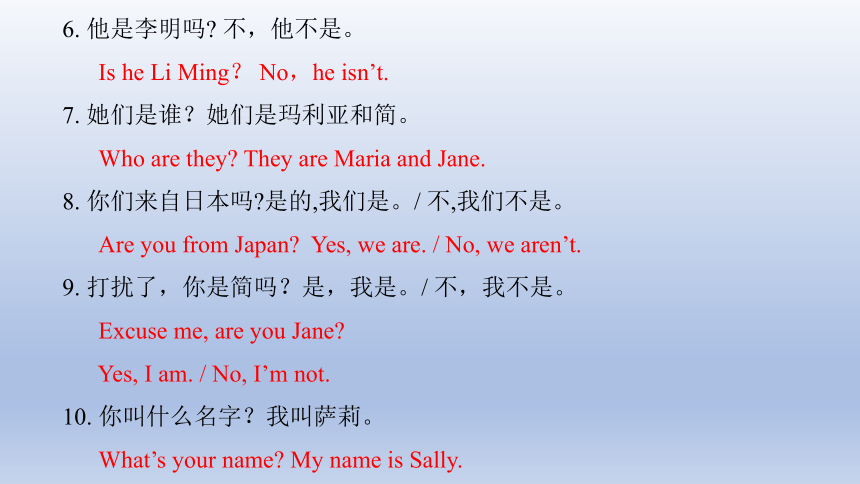
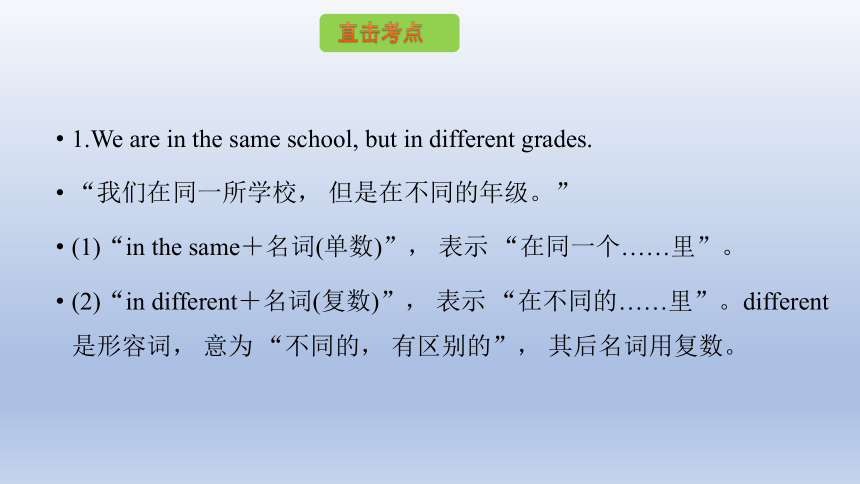
文档简介
(共39张PPT)
七年级 上册
Unit 1
Making New Friends
2. Where are you from
英 语
仁爱版
2. Where are you from
掌握
基础词汇
单词乐翻天
掌握
基础词汇
掌握
基础词汇
掌握
基础词汇
掌握
基础词汇
1. 劳驾,打扰
2. 来自
3. 电话号码
4. …岁
5. 用英语
6. 非常,很
7. 初中
8. 好朋友
excuse me
be(am/is/are) from
telephone number
year(s) old
in English
very much
junior high school
good friend(s)
词组堡垒
9你的/我的名字
10.来自
11.全名
12.姓
13.名
14.你的/我的/他的/她的电话号码
用谢。
15.介绍)这是……
.your/my name
be from=come from
.full name
family name=last name
given name=first name
your/my/his/her telephone number
That’s OK.
.This is ...(介绍)
1. 很高兴见到你。 我也很高兴见到你。
Nice to meet /see you. /Nice to meet/see you, too.
2. 你好。
How do you do
3. 你好吗?很好,谢谢。
How are you / I’m fine, thank you./Fine,thanks.
4. 再见。
See you (later). / Bye-bye. / Goodbye.
5. 她是简吗?是的,她是。
Is she Jane Yes, she is.
小小翻译家
6. 他是李明吗 不,他不是。
Is he Li Ming? No,he isn’t.
7. 她们是谁?她们是玛利亚和简。
Who are they They are Maria and Jane.
8. 你们来自日本吗 是的,我们是。/ 不,我们不是。
Are you from Japan Yes, we are. / No, we aren’t.
9. 打扰了,你是简吗?是,我是。/ 不,我不是。
Excuse me, are you Jane
Yes, I am. / No, I’m not.
10. 你叫什么名字?我叫萨莉。
What’s your name My name is Sally.
1.We are in the same school, but in different grades.
“我们在同一所学校, 但是在不同的年级。”
(1)“in the same+名词(单数)”, 表示 “在同一个……里”。
(2)“in different+名词(复数)”, 表示 “在不同的……里”。different是形容词, 意为 “不同的, 有区别的”, 其后名词用复数。
直击考点
( )Tom’s job is very any other job , but it is a really important one. (改编自2020 湖北武汉)
A.the same as B.interested in C.different from
C
2.What does she look like “她长什么样?”
What do/does sb.look like “某人长什么样子?”。答语如下:
(1)主语+be+描述人外貌特征的形容词;
(2)主语+have/has+一或多个形容词+名词。
( )—Li Hua her mother.
—Yeah. Both of them have black hair and black eyes.(2020 湖北仙桃)
A.looks like B.looks at C.looks after
A
3.I’ll give it to her.
“我会把它给她的。”
give sth.to sb.=give sb.sth.“把某物给某人/给某人某物”。
当宾语为代词it或them时: give it/them to sb.
( )in China,people put lucky money in red envelopes and their children. (改编自2020 湖南邵阳)
A.give them to B.give to it C.give it
A
4.关于颜色的提问: What color is/are …?“……是什么颜色的?”
(1)——“那件T恤衫是什么颜色的?”
— ?
——“白色的。”
— . (改编自2020 四川凉山)
(2)——“那些手套是什么颜色的?”
—
——“蓝色的。”
—
What color is the T-shirt
It’s white
What color are those gloves?
They are blue.
5.I want to buy a T-shirt, a cap and a pair of shoes.
“我想买一件T恤衫、 一顶帽子和一双鞋。”
(1)“want to+动词原形”意为 “想要……”。
Amy “艾米想 养宠物”(改编自2021 湖北随州)
wants to keep pets
6.The girl in a yellow dress is Maria.
“穿黄色连衣裙的那个女孩是玛丽亚。”
“in+颜色=in a/an+颜色+衣服” 表示 “穿……颜色的衣服”。如:
The woman is my aunt.
=The woman is my aunt. “那个穿红色外套的女人是我的阿姨。” (改编自2021 江苏扬州)
in red
in a red coat
7.I think it’s Kangkang’s.
“我认为它是康康的。”
Kangkang’s是名词所有格, 表示所有/所属关系, 意为 “……的”。名词所有格的三种形式:
有生命的事物
在名词后加’s
以s结尾的
名词后加’
无生命的事物 与of构成词组。
“这间教室的门” the door(s) of the classroom
“这所学校的操场” the playground of the school
冠词、数词、不定代词、指示代词等与名词所有格同时修饰一个名词 词组+of+名词所有格/名词性物主代词。
“他妈妈的一位朋友” a friend of his mother’s
“你的一位朋友” a friend of yours
8. Where is she from 或Where’s she from
这是询问某人来自何处的一个特殊疑问句。
.Where are you /they from 这是特殊疑问句,常用来询问某人来自何地或某人的籍贯。
Where常用来对地点提问。
be from=come from 意思是“从……来”或“来自……”。
A: Where are you /they from 你(你们)/他们来自哪里?
B:I’m/We’re /They’re from Canada. 我/我们/他们来自加拿大。
A:Where is he/she from 他/她来自哪里?
B:He’s /She’s from America. 他/她来自美国
—____
—We are from Guangdong.
A.Who are you B. Where are you from C. How are you
【答案】B
【解析】回答语是介绍来自于哪个国家,问国籍的只有B,A问的是身份,
C问的是身体情况,故只能选B。
典型例题
9. What is your name 或What’s your name
这是询问某人姓名时常用的一个特殊疑问句,回答时常用My name is ...或I’m ...
e.g. What’s your name 你叫什么名字?
My name is Jane. 或I’m Jane. 我叫简。
—___ _ your name
—My name is Kate.
A. What’s B. Who C. How’s
【答案】A
【解析】What’s 是什么;Who谁;How’s如何,怎样。根据下文,我的名字是凯特。可知上文问的是,你叫什么名字,故选A。
考点:考查疑问词辨析。
典型例题
10. I, you, he, she, it, we, they是人称代词的主格形式,用作主语。
my, your, his, her是形容词性物主代词,用在名词前,作定语。
e.g. She is from Japan. Her name is Kumiko. 她来自日本。她的名字叫久美子。
11.一般疑问句,简单回答Yes,.../No,...就可以。is not=isn’t
A:Are you/they from Japan 你(你们)他/她们来自日本吗?
B: Yes,I am/we are./they are. 是的,我是/我们是。/他们是。
B:No,I’m not./We aren’t. /they aren’t. 不,我不是/我们不是。/他们不是。
A:Is she/he from China,too 她/他也来自中国吗?
B:Yes,she/he is. /No,she/he isn’t. 是的,她/他是。不,她/他不是。
1.This is my pencil.(一般疑问句,并作否定回答)
______ this _________ pencil No, ______ ________.
2.These are my books. (一般疑问句,并作肯定回答)
______ these ___________ books Yes, ______ _________.
【答案】1.Is ,your,it‘s not 2.Are your, they are
【解析】
1.一般疑问句是把be动词Is提到主语前,my改成your;否定回答是:No, it’s not.
2.一般疑问句是把be动词Are提到主语前,my改成your;肯定回答Yes, they are.
典型例题
5.Who are they 这是特殊疑问句,当询问某人是谁时,应用who。
.A:Who are they 她们是谁?
B: They are Maria and Jane. 她们是玛利亚和简。
A: Who’s he/she 他/她是谁?
B:He’s Michael Jordan./She’s DengYaping. 他是迈克尔乔丹。她是邓亚萍。
— Who are they
_____ .
A. They are my pens B. Those are my cups
C. They are my friends D. These are my parents
【答案】C
【解析】句意:他们是谁?They are my pens它们是我的钢笔;Those are my cups那些是我的杯子; They are my friends他们是我的朋友;These are my parents这些是我的父母。问句中的they在答语中通常还用they。Who谁,是对人提问。所以选C。
典型例题
Ⅰ.用 Who ,where填空。
1)—__are they —They are Maria and Jane.
2)—___ are they —They are here.
【解析】
1)Who谁;;Where哪儿;根据下文,他们是玛利亚和简。可知上文问的是,他们是谁?故选Who。
2)根据下文,他们在这儿。可知上文问的是,他们在哪 故选Where.
词汇纵横
----_______ her telephone number
----_______ telephone number is 055-1234.
A. What; My B. What’s; Her C. What’s; My D. What; Her
【答案】B
【解析】句意:她的电话号码是多少?她的电话号码是055-1234. 固定句型:What’s your telephone number 你的电话号码是多少?故此排除AD两项。第二空名词短语telephone number 缺少形容词作定语,所以承接上文用her,所以排除C项。根据题意B正确。
考点:固定句型与形容词性物主性物
典型例题
12.A:Thank you very much. 非常感谢你。
B: That’s OK./You’re welcome. 不用谢。
---Thank you.
--- .
A. Thank you. B. Sure. C. You are welcome.
【答案】C
【解析】句意:-谢谢你。-不客气。Thank you.谢谢你;Sure.当然;You are welcome.不客气。当别人对你表示感谢的时候,你应该用You are welcome 来回答。故选C。考点:考查日常交际用语。
典型例题
一. 英语字母在什么情况下大写?
(1)英语句子的第一个词的第一个字母要大写。
(2)姓名中的姓和名的首字母都要大写。
e.g. Wang Ling王玲, Sima Qian司马迁, Zhou weiping周伟平。
(3)国家、城市、乡镇等地点名称的首字母要大写。
e.g. Canada加拿大,Beiijing北京。
(4)表示语言、某国人等词的首字母要大写。
e.g. English英语,German德国人。
(5)表示职务或称呼的首字母要大写。
(6)人称代词“I”和单词“OK”总是大写。
梳理语法
二、 have/has 的用法
第一、 二、 三人称复数形式(have) 第三人称单数形式(has)
否定句 主+don’t+have … 主+doesn’t+have …
一般疑问句 Do+主+have …? Does+主+have …?
答句 Yes, they do./No, they don’t. Yes, he/she/it does./No, he/she/it doesn’t.
She (have) long hair.
We (have) a big meal.
What Dave (have)
What Ann and Tom (have)
Peter and I (have) breakfast at six o’clock every day.
has
have
does
have
do
have
have
典型例题
三、 物主代词
物主代词分为形容词性物主代词(放名词前)和名词性物主代词(一般不单独使用)。
Is this (you) bag?
Is that basketball (you)
This pen isn’t (he).
(we) skirts are here.
(they) are over there.
your
yours
his
Our
Theirs
典型例题
1.你想询问对方的名字,你可以这样问:
2. 当你和朋友告别时,你可以这么说:
.
3.第一次跟别人见面,你可以跟别人这样问候:
____________________________.
4.你想问新来的同学来自哪里,你可以这样问:
____________________________
5.你在电话里问对方是谁,可以这样问:
_______________________________________
.What’s your name
Goodbye./ Bye-bye./ Bye.
Nice to meet you
Where are you from
Who’s that speaking
情景交际
七年级 上册
Unit 1
Making New Friends
2. Where are you from
英 语
仁爱版
2. Where are you from
掌握
基础词汇
单词乐翻天
掌握
基础词汇
掌握
基础词汇
掌握
基础词汇
掌握
基础词汇
1. 劳驾,打扰
2. 来自
3. 电话号码
4. …岁
5. 用英语
6. 非常,很
7. 初中
8. 好朋友
excuse me
be(am/is/are) from
telephone number
year(s) old
in English
very much
junior high school
good friend(s)
词组堡垒
9你的/我的名字
10.来自
11.全名
12.姓
13.名
14.你的/我的/他的/她的电话号码
用谢。
15.介绍)这是……
.your/my name
be from=come from
.full name
family name=last name
given name=first name
your/my/his/her telephone number
That’s OK.
.This is ...(介绍)
1. 很高兴见到你。 我也很高兴见到你。
Nice to meet /see you. /Nice to meet/see you, too.
2. 你好。
How do you do
3. 你好吗?很好,谢谢。
How are you / I’m fine, thank you./Fine,thanks.
4. 再见。
See you (later). / Bye-bye. / Goodbye.
5. 她是简吗?是的,她是。
Is she Jane Yes, she is.
小小翻译家
6. 他是李明吗 不,他不是。
Is he Li Ming? No,he isn’t.
7. 她们是谁?她们是玛利亚和简。
Who are they They are Maria and Jane.
8. 你们来自日本吗 是的,我们是。/ 不,我们不是。
Are you from Japan Yes, we are. / No, we aren’t.
9. 打扰了,你是简吗?是,我是。/ 不,我不是。
Excuse me, are you Jane
Yes, I am. / No, I’m not.
10. 你叫什么名字?我叫萨莉。
What’s your name My name is Sally.
1.We are in the same school, but in different grades.
“我们在同一所学校, 但是在不同的年级。”
(1)“in the same+名词(单数)”, 表示 “在同一个……里”。
(2)“in different+名词(复数)”, 表示 “在不同的……里”。different是形容词, 意为 “不同的, 有区别的”, 其后名词用复数。
直击考点
( )Tom’s job is very any other job , but it is a really important one. (改编自2020 湖北武汉)
A.the same as B.interested in C.different from
C
2.What does she look like “她长什么样?”
What do/does sb.look like “某人长什么样子?”。答语如下:
(1)主语+be+描述人外貌特征的形容词;
(2)主语+have/has+一或多个形容词+名词。
( )—Li Hua her mother.
—Yeah. Both of them have black hair and black eyes.(2020 湖北仙桃)
A.looks like B.looks at C.looks after
A
3.I’ll give it to her.
“我会把它给她的。”
give sth.to sb.=give sb.sth.“把某物给某人/给某人某物”。
当宾语为代词it或them时: give it/them to sb.
( )in China,people put lucky money in red envelopes and their children. (改编自2020 湖南邵阳)
A.give them to B.give to it C.give it
A
4.关于颜色的提问: What color is/are …?“……是什么颜色的?”
(1)——“那件T恤衫是什么颜色的?”
— ?
——“白色的。”
— . (改编自2020 四川凉山)
(2)——“那些手套是什么颜色的?”
—
——“蓝色的。”
—
What color is the T-shirt
It’s white
What color are those gloves?
They are blue.
5.I want to buy a T-shirt, a cap and a pair of shoes.
“我想买一件T恤衫、 一顶帽子和一双鞋。”
(1)“want to+动词原形”意为 “想要……”。
Amy “艾米想 养宠物”(改编自2021 湖北随州)
wants to keep pets
6.The girl in a yellow dress is Maria.
“穿黄色连衣裙的那个女孩是玛丽亚。”
“in+颜色=in a/an+颜色+衣服” 表示 “穿……颜色的衣服”。如:
The woman is my aunt.
=The woman is my aunt. “那个穿红色外套的女人是我的阿姨。” (改编自2021 江苏扬州)
in red
in a red coat
7.I think it’s Kangkang’s.
“我认为它是康康的。”
Kangkang’s是名词所有格, 表示所有/所属关系, 意为 “……的”。名词所有格的三种形式:
有生命的事物
在名词后加’s
以s结尾的
名词后加’
无生命的事物 与of构成词组。
“这间教室的门” the door(s) of the classroom
“这所学校的操场” the playground of the school
冠词、数词、不定代词、指示代词等与名词所有格同时修饰一个名词 词组+of+名词所有格/名词性物主代词。
“他妈妈的一位朋友” a friend of his mother’s
“你的一位朋友” a friend of yours
8. Where is she from 或Where’s she from
这是询问某人来自何处的一个特殊疑问句。
.Where are you /they from 这是特殊疑问句,常用来询问某人来自何地或某人的籍贯。
Where常用来对地点提问。
be from=come from 意思是“从……来”或“来自……”。
A: Where are you /they from 你(你们)/他们来自哪里?
B:I’m/We’re /They’re from Canada. 我/我们/他们来自加拿大。
A:Where is he/she from 他/她来自哪里?
B:He’s /She’s from America. 他/她来自美国
—____
—We are from Guangdong.
A.Who are you B. Where are you from C. How are you
【答案】B
【解析】回答语是介绍来自于哪个国家,问国籍的只有B,A问的是身份,
C问的是身体情况,故只能选B。
典型例题
9. What is your name 或What’s your name
这是询问某人姓名时常用的一个特殊疑问句,回答时常用My name is ...或I’m ...
e.g. What’s your name 你叫什么名字?
My name is Jane. 或I’m Jane. 我叫简。
—___ _ your name
—My name is Kate.
A. What’s B. Who C. How’s
【答案】A
【解析】What’s 是什么;Who谁;How’s如何,怎样。根据下文,我的名字是凯特。可知上文问的是,你叫什么名字,故选A。
考点:考查疑问词辨析。
典型例题
10. I, you, he, she, it, we, they是人称代词的主格形式,用作主语。
my, your, his, her是形容词性物主代词,用在名词前,作定语。
e.g. She is from Japan. Her name is Kumiko. 她来自日本。她的名字叫久美子。
11.一般疑问句,简单回答Yes,.../No,...就可以。is not=isn’t
A:Are you/they from Japan 你(你们)他/她们来自日本吗?
B: Yes,I am/we are./they are. 是的,我是/我们是。/他们是。
B:No,I’m not./We aren’t. /they aren’t. 不,我不是/我们不是。/他们不是。
A:Is she/he from China,too 她/他也来自中国吗?
B:Yes,she/he is. /No,she/he isn’t. 是的,她/他是。不,她/他不是。
1.This is my pencil.(一般疑问句,并作否定回答)
______ this _________ pencil No, ______ ________.
2.These are my books. (一般疑问句,并作肯定回答)
______ these ___________ books Yes, ______ _________.
【答案】1.Is ,your,it‘s not 2.Are your, they are
【解析】
1.一般疑问句是把be动词Is提到主语前,my改成your;否定回答是:No, it’s not.
2.一般疑问句是把be动词Are提到主语前,my改成your;肯定回答Yes, they are.
典型例题
5.Who are they 这是特殊疑问句,当询问某人是谁时,应用who。
.A:Who are they 她们是谁?
B: They are Maria and Jane. 她们是玛利亚和简。
A: Who’s he/she 他/她是谁?
B:He’s Michael Jordan./She’s DengYaping. 他是迈克尔乔丹。她是邓亚萍。
— Who are they
_____ .
A. They are my pens B. Those are my cups
C. They are my friends D. These are my parents
【答案】C
【解析】句意:他们是谁?They are my pens它们是我的钢笔;Those are my cups那些是我的杯子; They are my friends他们是我的朋友;These are my parents这些是我的父母。问句中的they在答语中通常还用they。Who谁,是对人提问。所以选C。
典型例题
Ⅰ.用 Who ,where填空。
1)—__are they —They are Maria and Jane.
2)—___ are they —They are here.
【解析】
1)Who谁;;Where哪儿;根据下文,他们是玛利亚和简。可知上文问的是,他们是谁?故选Who。
2)根据下文,他们在这儿。可知上文问的是,他们在哪 故选Where.
词汇纵横
----_______ her telephone number
----_______ telephone number is 055-1234.
A. What; My B. What’s; Her C. What’s; My D. What; Her
【答案】B
【解析】句意:她的电话号码是多少?她的电话号码是055-1234. 固定句型:What’s your telephone number 你的电话号码是多少?故此排除AD两项。第二空名词短语telephone number 缺少形容词作定语,所以承接上文用her,所以排除C项。根据题意B正确。
考点:固定句型与形容词性物主性物
典型例题
12.A:Thank you very much. 非常感谢你。
B: That’s OK./You’re welcome. 不用谢。
---Thank you.
--- .
A. Thank you. B. Sure. C. You are welcome.
【答案】C
【解析】句意:-谢谢你。-不客气。Thank you.谢谢你;Sure.当然;You are welcome.不客气。当别人对你表示感谢的时候,你应该用You are welcome 来回答。故选C。考点:考查日常交际用语。
典型例题
一. 英语字母在什么情况下大写?
(1)英语句子的第一个词的第一个字母要大写。
(2)姓名中的姓和名的首字母都要大写。
e.g. Wang Ling王玲, Sima Qian司马迁, Zhou weiping周伟平。
(3)国家、城市、乡镇等地点名称的首字母要大写。
e.g. Canada加拿大,Beiijing北京。
(4)表示语言、某国人等词的首字母要大写。
e.g. English英语,German德国人。
(5)表示职务或称呼的首字母要大写。
(6)人称代词“I”和单词“OK”总是大写。
梳理语法
二、 have/has 的用法
第一、 二、 三人称复数形式(have) 第三人称单数形式(has)
否定句 主+don’t+have … 主+doesn’t+have …
一般疑问句 Do+主+have …? Does+主+have …?
答句 Yes, they do./No, they don’t. Yes, he/she/it does./No, he/she/it doesn’t.
She (have) long hair.
We (have) a big meal.
What Dave (have)
What Ann and Tom (have)
Peter and I (have) breakfast at six o’clock every day.
has
have
does
have
do
have
have
典型例题
三、 物主代词
物主代词分为形容词性物主代词(放名词前)和名词性物主代词(一般不单独使用)。
Is this (you) bag?
Is that basketball (you)
This pen isn’t (he).
(we) skirts are here.
(they) are over there.
your
yours
his
Our
Theirs
典型例题
1.你想询问对方的名字,你可以这样问:
2. 当你和朋友告别时,你可以这么说:
.
3.第一次跟别人见面,你可以跟别人这样问候:
____________________________.
4.你想问新来的同学来自哪里,你可以这样问:
____________________________
5.你在电话里问对方是谁,可以这样问:
_______________________________________
.What’s your name
Goodbye./ Bye-bye./ Bye.
Nice to meet you
Where are you from
Who’s that speaking
情景交际
同课章节目录
- Unit 1 Making new friends
- Topic 1 Welcome to China!
- Topic 2 Where are you from?
- Topic 3 How old are you?
- Unit 2 Looking different
- Topic 1 I have a small nose
- Topic 2 What does she look like?
- Topic 3 Whose jacket is this?
- Unit 3 Getting togethe
- Topic 1 Does he speak Chinese?
- Topic 2 What do your parents do?
- Topic 3 What would you like to drink?
- Unit 4 Having fun
- Topic 1 What can I do for you?
- Topic 2 Would you like to cook with us?
- Topic 3 What time is it now?
